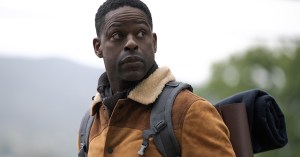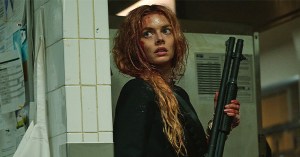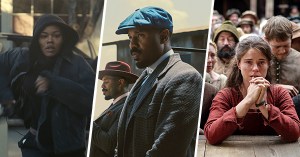Terry Gilliam Talks Doctor Parnassus
The legendary director discusses fate, losing his friend Heath Ledger, and why he thinks filmmaking is so 'unreasonable'

He’s known as Captain Chaos and his productions are notoriously problematic. Brazil (1985) almost never saw the light of day when battles raged over final cut. On The Adventures of Baron Munchausen (1988), Gilliam was almost fired when the budget spiraled out of control. He thought his career was over when The Man Who Killed Don Quixote (2000) collapsed six days into shooting after flash floods and the lead actor’s herniated disc brought everything to a standstill. But nothing compares to his latest film, The Imaginarium of Doctor Parnassus, on which his friend and lead actor Heath Ledger was found dead half way through production in January 2008. Here Gilliam talks about fate, losing his friend and why filmmaking is so unreasonable.
RT: Where were you when you heard the news about Heath Ledger?
Terry Gilliam: I was in Vancouver because we’d just finished in London. I went to Vancouver, Heath went to New York and two days later he was dead. I’m sitting, working in Vancouver and Amy, my daughter, who’s producing, said: “You got to come into this room” And I said: “What’s up?” And there it was it on her laptop, on the BBC website: “Heath Ledger found dead.” It’s impossible to believe it; there’s no way he could be dead. It seemed it took all day before it began to really sink in that he was dead. Then I just didn’t know what to do.
How much had you shot?
We’d shot about 40% of Heath’s stuff that was supposed to be done, so I said we can’t finish the film, it’s over. I was ready to quit but Amy and the others wouldn’t let me quit. It took several days before I thought, ‘Well, is there a way? Can we?’ I went back to London. It took us a week and a half before I began to think, ‘Maybe there is a way of fixing it.’ But I was never sure; even when we started shooting again there were certain scenes I’d thought we were going to do one way and we couldn’t do it, so it was constantly adjusting to reality.

How chaotic was this shoot given what happened to Heath Ledger?
Once Heath had died and once we had found a way of moving forward — which was to cast three actors in the role Heath was playing — it was very difficult scheduling trying to get Johnny [Depp], Colin [Farrell] and Jude [Law], because they were all involved in other projects. There was a lot of luck involved because Public Enemies, the film Johnny was doing, was actually delayed one week, which allowed us to get him on board. But we had to keep constantly adjusting our schedule. Once we’d finished shooting, things were fine and then it was just a matter of assembling it to see if it worked. The first time we did the first cut of the movie we saw it worked. The thing that convinced me was that the sound man, who was doing the post-production sound, he didn’t know what had happened, he didn’t know the script and he just assumed it was written to be like that. So I thought, ‘Okay, it works.’
This movie shows just how talented Ledger was. Did it upset you when the media tried to make out that his death was from a drug overdose?
All the stories were bulls***. This is when the real imagination or lack of imagination of the press comes in, because they were trying to turn him into something he wasn’t. That playing the Joker had made him crazy — absolute nonsense. Heath was so solid, his feet were on the ground and he was the least neurotic person I’ve ever met. That’s why it became so impossible to understand. But for the outside world they had to try to sort of invent a reason. So it must have been all these other things: drugs. It wasn’t drugs. It was prescription drugs — but even that doesn’t make sense completely. Nothing makes sense except that Heath was not what they thought he was. He’s this incredibly intelligent, generous, sweet, wise, solid as a rock and playful, unbelievably playful. So when he acted it was the playing but he did it fearlessly. There was none of this twisted neurosis that a lot of actors suffer from.

Did you have to change the script much after he died?
No. Everything Johnny says was written before Heath died. It’s spooky. I didn’t change any dialogue in the script. All that stuff which goes “He will live forever, you will never grow old” was all written. That was the movie and I didn’t change anything because that’s the movie that Heath and I set out to make. There is a line that Christopher Plummer says earlier on, when he is talking about the story he says that “It’s a romance, a comedy, a tale of unforeseen death.” And Christopher didn’t want to say that line because it was after Heath died. I said, “We have to say the line that was written, that was the movie we’re making.” I didn’t change a single word.
You’ve been dubbed ‘Captain Chaos’ — how much chaos do you actually need on set to be creative?
[laughs] I don’t want chaos. I actually want order. I really want it ordered very well and I want to surround myself with really well organized people so that when we’re on the set and an idea comes in we can play with it because we got a really good structure around this. So it’s not chaos, it’s always between me and the actors, or Nicola [Pecorini], the director of photography. Oh, what if we did that? Okay, we can do that. So the organized people think it’s chaos, but it’s not, it’s just I’d build a structure that’s really solid so that even when the lead actor dies, we can finish the film. [laughs]


Let’s talk about some of your films where the chaos got kind of out of hand, like Brazil. You were kind of paralyzed afterwards for a while, why?
That was after nine months of shooting. I just went catatonic because I was worn out, I just thought, ‘This is never going to end. I cannot move anymore’ and I thought maybe that’d stop the film.
When you did The Man Who Killed Don Quixote the film was shut down after flash floods ruined the set and your lead actor had to be hospitalized. Then on The Brothers Grimm you got into a fight with the producers, and the movie was delayed. And now this unfortunately has happened. Do you think you’re cursed?
[laughs] I don’t know. I used to blame Herzog for the kind of movies he made because he brought danger and disaster down on his. I used to laugh about what he did and then I find I’m being dragged into that world. I don’t know, none of it is planned, none of it is hoped for — things happen. Fate deals you certain cards and you play the hand or you don’t play the hand. I just had some interesting hands to play.

Well you’ve experienced it all now: death, illness, force majeure, fights — what disaster is left?
That’s the problem. I can’t top this one. It’s been one of the most tragic things ever in my life and one of the most magical things in my life, because I have Johnny, Colin and Jude coming in rescuing the whole thing, working for nothing. All the money is going to Heath’s daughter [Matilda] — that’s pretty extraordinary.
The three actors that replaced Ledger haven’t really done any publicity for the film. Why?
I was talking to Colin and he really felt that this wasn’t his film. They just came in, and did their best. They don’t want to be a distraction to Heath or take credit for things.

Given what happened with The Man Who Killed Don Quixote, does a part of you ever stop to think, ‘Maybe I should just leave this one alone and move on?’
If you’re going to play with Quixote you really got to play with Quixote. And those were windmills that came along. Those were giants, they killed us once but we’re going to come back. Everybody says “Oh, forget about it, put it in the past. Move on.” No, I won’t because that all sounds so reasonable and I don’t think films should be reasonable. The business we’re in is about exciting people, stimulating people, doing things, changing them, outraging them — it’s not a reasonable business. Especially when you’re spending the gross national product of a country to make a silly movie — this is not reasonable.
What’s your goal when you make a film?
To affect somebody. To make a difference in their life, to make sure they react to something. That’s what I thought movies were about, because movies did that to me. They completely altered my view on the world. Movies were constantly changing me. Every time I saw them I was blown away; not by the normal movies, not by the ones that Doris Day and Rock Hudson did but by real movies like Kubrick, Fellini, Bergman. They really changed me and I just wanted to carry on that tradition.






